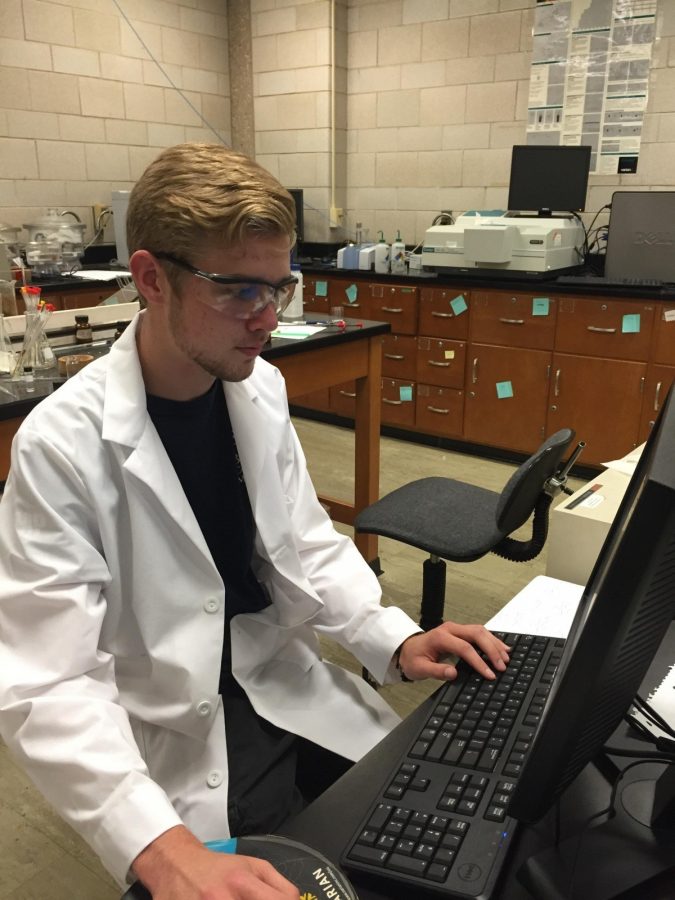While many Texas Wesleyan students and professors spent their summer at the pool, many chemistry and biochemistry students were in the lab researching how to combat tuberculosis.
The study was funded by the Robert A. Welch Foundation, the largest private funding organization centered around basic chemical research, according to welch1.org.
Tuberculosis is a rare disease in the United States that focuses mainly on the host’s lungs, according to mayoclinic.org.
The research was led by three professors: Dr. Michael Weir, assistant professor of analytical chemistry; Dr. Phillip Pelphrey, associate professor of chemistry; and Dr. Terrence Neumann, assistant professor of biochemistry.
Neumann said he is thankful that the department was able to conduct the research, and believes the program to be beneficial to his students.
“The Welch Foundation grant allows us to pay students for their summer work,” Neumann said.
He believes undergraduate research helps prepare students for the current work force.
“Undergraduate research conducted in our department allows students to investigate projects apart from the traditional classroom curriculum,” Neumann said. “Throughout this time, students grow and develop into critical thinkers who are able to dissect problems and propose solutions to them.”
The professors were assisted by chemistry and biochemistry majors Michelle Phillips, Charlotte Salin, Colton Clanton, Cody Dorton and Forrest Kneten, according to www.txwes.edu.
Some students, like Kneten, a senior biochemistry major, came into the study with prior knowledge.
Kneten had a year’s worth of intel relative to the subject, and focused on how well proteins reacted to Dihydrofolate Reductase, or DHFR.
“We’re trying to find a drug that will inhibit DHFR in microbacterium tuberculosis,” Kneten said.
DHFR is a bacterial enzyme responsible for creating a part of DNA, and if it ceases to function, it will kill the cell, Kneten said.
Some students, like Dorton, a junior chemistry major, were able to get a fresh feel for the topic.
Dorton’s research focused on trying to develop an antibiotic that targets DHFR, he said.
Though the project ended in August, Dorton is going beyond the summer program and to continue working on his findings.
“I think I will be continuing the research project,” Dorton said. “Next semester, I will be in an official research class, and this is the study I will be working on.”
Neumann said that the success of the research couldn’t be determined in such a short time frame, but he knows his students made progress toward understanding “the central keys of the project.”









![Pippin, played by Hunter Heart, leads a musical number in the second act of the musical. [Photo courtesy Kris Ikejiri]](https://therambler.org/wp-content/uploads/2025/04/Pippin-Review-1200x800.jpg)
![Harriet and Warren, played by Trinity Chenault and Trent Cole, embrace in a hug [Photo courtesy Lauren Hunt]](https://therambler.org/wp-content/uploads/2025/02/lettersfromthelibrary_01-1200x800.jpg)
![Samantha Barragan celebrates following victory in a bout. [Photo courtesy Tu Pha]](https://therambler.org/wp-content/uploads/2025/05/20250504_164435000_iOS-834x1200.jpg)





![Hunter Heart (center), the play's lead, rehearses a scene alongside other student actors. [Photo courtesy Jacob Sanchez]](https://therambler.org/wp-content/uploads/2025/04/thumbnail_IMG_8412-1200x816.jpg)
![Student actors rehearse for Pippin, Theatre Wesleyan's upcoming musical. [Photo courtesy Jacob Rivera-Sanchez]](https://therambler.org/wp-content/uploads/2025/04/Pippin-Preview-1200x739.jpg)
![[Photo courtesy Brooklyn Rowe]](https://therambler.org/wp-content/uploads/2025/05/CMYK_Shaiza_4227-1080x1200.jpg)

![Lady Rams softball wraps up weekend against Nelson Lions with a victory [6 – 1]](https://therambler.org/wp-content/uploads/2025/04/Screenshot-2025-04-04-100924-1200x647.png)
















